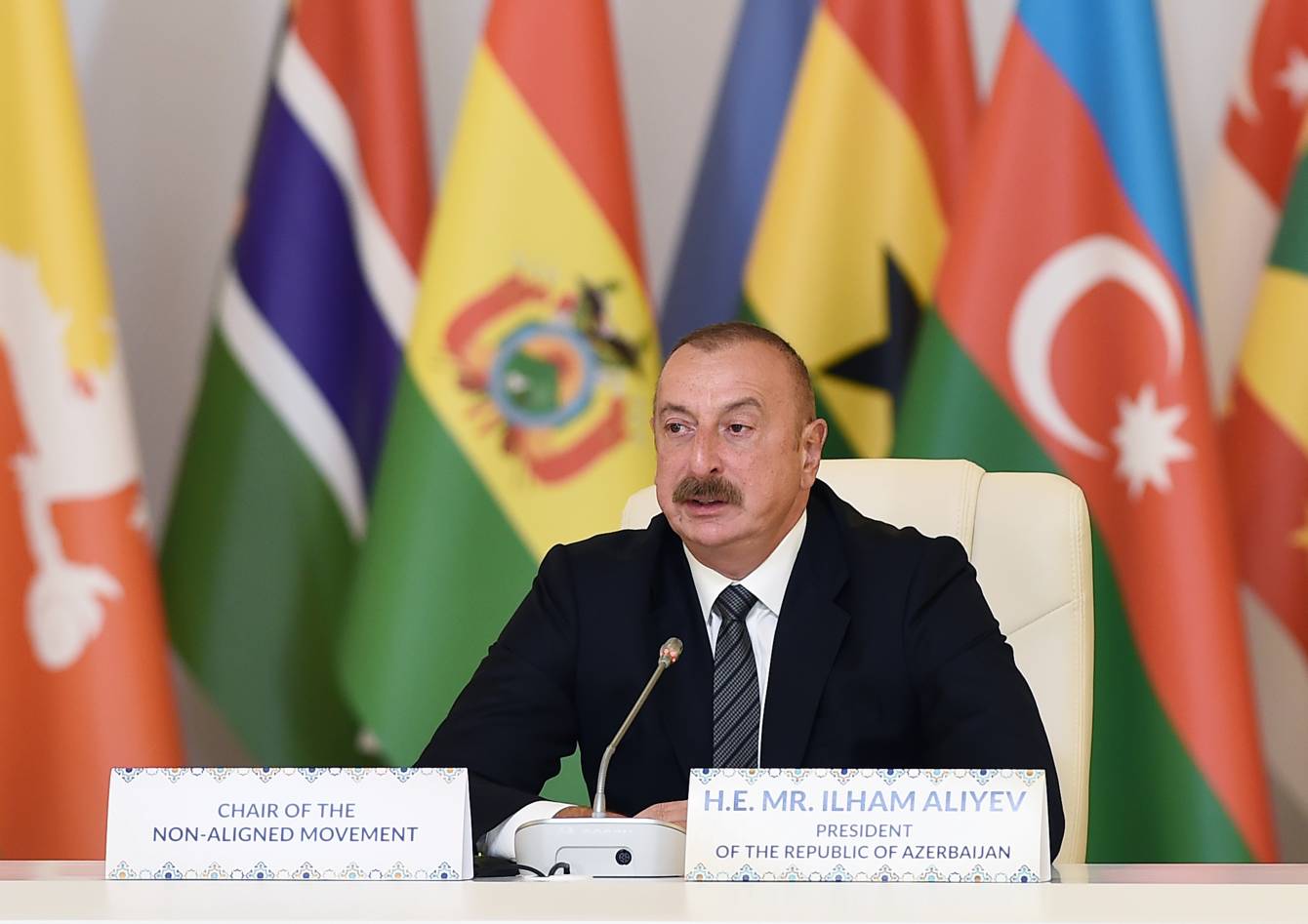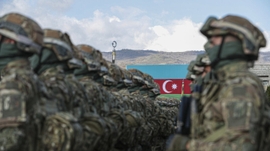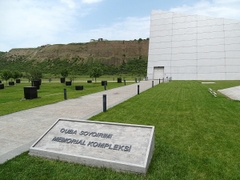President Ilham Aliyev thanked the members of the Non-Aligned Movement (NAM) for their support for Azerbaijan during the 2020 war with Armenia.
“Another important sign of solidarity we saw in the most difficult times in our country was when we were liberating our territories after almost 30 years of Armenian occupation,” President Aliyev said while addressing the Baku Conference of the Non-Aligned Movement Parliamentary Network on Thursday.
According to him, some countries launched campaigns of discreditation, slander, and blackmail against Azerbaijan during the war.
“But, our friends, members of NAM, at that time members of the UN Security Council, blocked an anti-Azerbaijani statement and blocked the attempt of accusation against Azerbaijan and thus, did not allow pro-Armenian global forces to attack Azerbaijan,” President Aliyev added.
Formed during the height of the Cold War, the Non-Aligned Movement (NAM) is an alliance of 120 countries in nearly all regions of the world. Member states account for a population of 4.3 billion people. The movement is considered the world’s largest political institution after the UN General Assembly. Its primary goal is to foster global peace, safety, and development based on respect for international law.
In October 2019, Azerbaijan took over the chairmanship of NAM from Venezuela on a rotating basis - a position that the country will hold until 2023 upon the request of the member states.
Since becoming the organization’s full-fledged member in 2011, Azerbaijan has received strong support from the member states, particularly regarding the Armenia-Azerbaijan conflict over the latter’s Karabakh (Garabagh) region. The final documents of the NAM Security Council unequivocally voiced the importance of resolving the conflict within Azerbaijan’s sovereignty, territorial integrity, and internationally recognized borders, as well as urged the implementation of four UN Security Council resolutions demanding immediate and unconditional withdrawal of Armenia’s forces from the occupied Azerbaijani lands.
In July 2020, after Armenia's armed forces targeted Azerbaijani positions stationed near the border between the two countries, NAM issued a communique strongly condemning the military provocation. The document stressed that the incident escalated tensions in the region and caused numerous casualties.
The four-day clashes between Armenia and Azerbaijan military lasted from July 12-16, 2020, and resulted in the retreat of the Armenian troops and the deaths of 12 Azerbaijani servicemen and one civilian. After this, the anti-Azerbaijan sentiments in Armenia had climaxed, catapulting the largest war in South Caucasus since 1994.
On September 27, 2020, the decades-old conflict between the two countries spiraled after Armenia’s forces deployed in occupied Azerbaijani lands shelled military positions and civilian settlements of Azerbaijan. During counter-attack operations, Azerbaijani forces liberated over 300 settlements, including the cities of Jabrayil, Fuzuli, Zangilan, Gubadli, and Shusha, from a nearly 30-year-long illegal Armenian occupation. The war ended in a statement signed on November 10, 2020, under which Armenia also returned the occupied Aghdam, Kalbajar, and Lachin districts to Azerbaijan.
At the height of the war, the UN Security Council tried to issue an anti-Azerbaijani statement initiated by Russia and France. However, seven NAM member states represented in the UN Security Council rejected the biased statement blocking its adoption on October 19, 2020.
NAM member countries have also condemned Armenia’s shelling of the Azerbaijani military and civilian positions along the frontline during the Second Karabakh War in a special statement adopted on October 9, 2020.







 Azerbaijan has been recognized as one of the safest countries in the world, ranking 90th among 163 countries on the Global Terrorism Index 2025 (GTI).
Azerbaijan has been recognized as one of the safest countries in the world, ranking 90th among 163 countries on the Global Terrorism Index 2025 (GTI).
 The Azerbaijani Defense Ministry has reported ongoing shelling of its army positions by Armenian forces since last week.
The Azerbaijani Defense Ministry has reported ongoing shelling of its army positions by Armenian forces since last week.
 Iranian Foreign Minister Abbas Araghchi has urged the International Atomic Energy Agency (IAEA) to take a "transparent position" regarding potentia...
Iranian Foreign Minister Abbas Araghchi has urged the International Atomic Energy Agency (IAEA) to take a "transparent position" regarding potentia...



